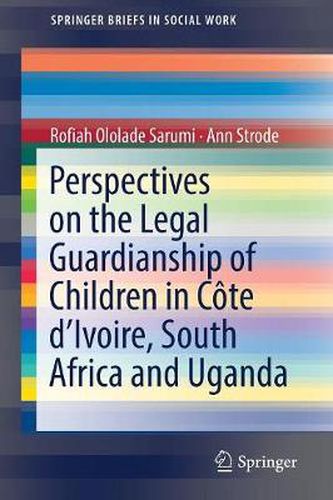Readings Newsletter
Become a Readings Member to make your shopping experience even easier.
Sign in or sign up for free!
You’re not far away from qualifying for FREE standard shipping within Australia
You’ve qualified for FREE standard shipping within Australia
The cart is loading…






This title is printed to order. This book may have been self-published. If so, we cannot guarantee the quality of the content. In the main most books will have gone through the editing process however some may not. We therefore suggest that you be aware of this before ordering this book. If in doubt check either the author or publisher’s details as we are unable to accept any returns unless they are faulty. Please contact us if you have any questions.
This brief reference surveys the national policy of three representative African countries on the legal guardianship of children who are without parents or families. Focusing on the widely varying legal systems of Cote d'Ivoire, South Africa, and Uganda, the authors highlight guardianship as emblematic of the continent’s shortcomings in child protection laws. The book’s key objective is bridging the communal aspects of traditional African society with the global standards set forth by the Convention on the Rights of the Child and other international entities. To this end, the three frameworks discussed here are compared and their strengths and limitations evaluated as applied to child protection standards in terms of core guardianship issues:
Holders of parental authority and responsibilities
Appointment of a legal guardian
Who qualifies as a legal guardian?
Responsibilities of a legal guardian in relation to the child
Termination of guardianships
The primary audience for Perspectives on the Legal Guardianship of Children in Cote d'Ivoire, South Africa, and Uganda includes academics, researchers, and students in the fields of children’s rights, human rights, legal guardianship, and international law. It will also prove a useful reference for NGOs that focus on children’s rights, social workers and practitioners operating within the context of these three countries, professionals working within the African human rights system, and governmental law- and policymakers.
$9.00 standard shipping within Australia
FREE standard shipping within Australia for orders over $100.00
Express & International shipping calculated at checkout
This title is printed to order. This book may have been self-published. If so, we cannot guarantee the quality of the content. In the main most books will have gone through the editing process however some may not. We therefore suggest that you be aware of this before ordering this book. If in doubt check either the author or publisher’s details as we are unable to accept any returns unless they are faulty. Please contact us if you have any questions.
This brief reference surveys the national policy of three representative African countries on the legal guardianship of children who are without parents or families. Focusing on the widely varying legal systems of Cote d'Ivoire, South Africa, and Uganda, the authors highlight guardianship as emblematic of the continent’s shortcomings in child protection laws. The book’s key objective is bridging the communal aspects of traditional African society with the global standards set forth by the Convention on the Rights of the Child and other international entities. To this end, the three frameworks discussed here are compared and their strengths and limitations evaluated as applied to child protection standards in terms of core guardianship issues:
Holders of parental authority and responsibilities
Appointment of a legal guardian
Who qualifies as a legal guardian?
Responsibilities of a legal guardian in relation to the child
Termination of guardianships
The primary audience for Perspectives on the Legal Guardianship of Children in Cote d'Ivoire, South Africa, and Uganda includes academics, researchers, and students in the fields of children’s rights, human rights, legal guardianship, and international law. It will also prove a useful reference for NGOs that focus on children’s rights, social workers and practitioners operating within the context of these three countries, professionals working within the African human rights system, and governmental law- and policymakers.